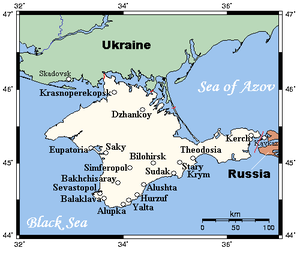Today's headlines......
http://rt.com/news/kiev-clashes-rioters-police-571/
Sunday, March 9
08:59 GMT:
Around 10,000 people have taken part in a rally in support of Ukraine in Maikop, in the Russian Republic of Adygea, local police report, as cited by Interfax.
08:54 GMT:
Ukraine’s self-imposed authorities have blocked the electronic system of Crimea’s treasury and frozen the autonomy’s accounts, said Crimean Deputy PM Rustam Temirgaliyev. However, he says this will not affect state payments like pensions, Interfax reports.
“We are now quickly opening accounts in Russian banks, including ruble accounts. People won’t have to go without pensions; the situation is under control,” he said, adding that local authorities will prevent any “catastrophic consequences” of Kiev’s recent move.
08:52 GMT:
Konstantin Dolgov, the Russian Foreign Ministry’s commissioner for human rights in his twitter uged western politicians not to let the leader of the Ukrainian ultra nationalist group “Right Sector”, Dmitry Yarosh, come to power.
“De-facto authorities in Kiev and their western patrons must block the access to power for neo nazi Yarosh and his backers,” Dolgov wrote.
“De-facto authorities in Kiev and their western patrons must block the access to power for neo nazi Yarosh and his backers,” Dolgov wrote.
08:45 GMT:
Five regional heads of police have been dismissed by Ukrainian Interior Minister Arsen Avakov, who announced the decision on his Facebook page. Those fired include Igor Avrutsky, the head of the Crimean police.
08:34 GMT:
According to estimates by Crimean authorities, two thirds of the region’s residents could vote in favor of joining Russia. RT’s Paula Slier went to Crimea’s capital, Simferopol, to collect opinions on the issue from people in the streets.
06:55 GMT:
Rallies in support of Ukraine and Russians living there will be held in a number of Russian cities on March 9 and 10. According to organizers, cited by Itar-Tass, around 30,000 people will take part. Rallies are expected to take place in Astrakhan, Pskov, Arkhangelsk, Chelyabinsk, Vologda, Perm and Chita.
06:52 GMT:
The Ukrainian coup-imposed government has announced its officials are subject to austerity cuts. The measure is “aimed at stabilizing the economic situation in the country as well as for saving and rational use of government funds,” the Ukrainian cabinet of ministers’ online statement reads. Austerity cuts are announced for government bodies and many kinds of state-sponsored enterprises and organizations. They have been ordered to stop buying cars (except ambulance, fire-fighting and rescue vehicles), furniture, mobile phones, laptops, etc. Charter flights and phone calls will no longer be reimbursed from the budget. Government officials will see their allowances cut.
Saturday, March 8
23:12 GMT:
The anti-fascist march activists were shot minutes after their protest finished in Kharkov, Ukraine, LifeNews and Glagol reported. A bus with ten people inside stopped and began shooting at the activists. The men then came closer and reportedly began beating the activists. Three people were injured, one of whom sustained a gunshot wound in his back.
22:31 GMT:
US President Barack Obama and French President Francois Hollande agreed in a phone conversation on Saturday to establish a contact group to help settle the Ukrainian crisis, which will require Russian consent. In case this does not work out, the West will be forced to introduce new measures that will "have a substantial impact on relations between the international community and Russia,” ITAR-TASS quoted the the Elysee Palace as saying.
“In the current serious circumstances, they stressed the importance for Russia to accept the formation of a contact group for initiating dialogue between Ukraine and Russia, in order to promote a peaceful way out of the crisis promptly and fully restore the sovereignty and territorial integrity of Ukraine,” Elysee Palace added.
22:11 GMT:
Around 3,000 people attended a rally on Kharkov's central square to voice support for ethnic Russians living in Crimea, on Saturday, Ruptly news agency reports. A heavy police presence was seen on the square, where they guarded the city hall and regional administration buildings.
Protesters chanted slogans such as "Russia-Russia", "Kharkiv-Kharkiv", and "Fascism will not pass".
Organizers of the rally voiced their willingness to protect Kharkiv from Kiev's new interim authorities. Organizers also stated they want to stop 'Bandera fascists from Kiev', and reinstate relations with 'brotherly Russia'.
Protesters chanted slogans such as "Russia-Russia", "Kharkiv-Kharkiv", and "Fascism will not pass".
Organizers of the rally voiced their willingness to protect Kharkiv from Kiev's new interim authorities. Organizers also stated they want to stop 'Bandera fascists from Kiev', and reinstate relations with 'brotherly Russia'.




 The deployments come just a week before the planned Crimean referendum on secession from the Ukraine. Russia is backing the referendum, and Russian parliament has expressed support for annexing Crimea should the voters demand it.
The deployments come just a week before the planned Crimean referendum on secession from the Ukraine. Russia is backing the referendum, and Russian parliament has expressed support for annexing Crimea should the voters demand it.
No comments:
Post a Comment